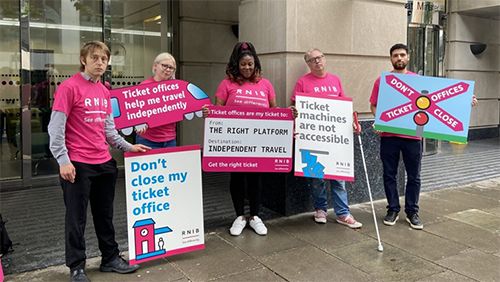RNIB
Successfully challenged the proposed closure of train station ticket offices
When the Rail Delivery Group (RDG) unveiled in July 2023 the proposals to close all train station ticket offices in England and Glasgow, RNIB immediately recognised the detrimental impact this would have on blind and partially sighted people and their ability to travel independently on the train network.
 RNIB research showed that only 3% of people with sight loss said they could use a ticket vending machine without problems; 58% said it was impossible. Many people cannot find the platform they need without assistance; many more said they would feel unsafe at a station if there were no staff around.
RNIB research showed that only 3% of people with sight loss said they could use a ticket vending machine without problems; 58% said it was impossible. Many people cannot find the platform they need without assistance; many more said they would feel unsafe at a station if there were no staff around.
Backed by a public backlash, RNIB campaigned vigorously to oppose the RDG’s plans, calling for consultation period to be extended beyond the initial three weeks, and ultimately demanding that all train ticket offices stay open. RNIB instigated an internal cross-organisation approach and worked closely with other sight-loss charities to align messaging and maximise impact.
In an early win, the consultation was extended until 1 September. This allowed RNIB enough time to navigate the complexity of the consultation process and create resources that could be used by other organisations and individuals to lobby the train companies, parliamentarians and the media.
The charity galvanised almost 2,000 supporters to send a letter to their MP asking them to share their concerns about this proposal with the transport minister, reaching nine out of 10 MPs. Hundreds of people wrote to their local newspapers to reiterate RNIB’s call to scrap the proposals. The campaign resulted in 1,121 pieces of media coverage across broadcast, print and online. And despite the challenges in the consultation process, 750,000 responses were received, making it the biggest public consultation in UK history.
The campaign was a success. It was announced on 31 October that the government had asked train operators to withdraw their proposals and keep the ticket offices open.
Charity Awards judge Karin Woodley, chief executive of Cambridge House, said that RNIB not only focused on the specific needs of their own beneficiary group, but cleverly triggered wider understanding of the problems that closing the stations would cause for others too, such as elderly people, those with restricted mobility or autism. “The innovation was in the way they framed it – it was based on diversity, it had a rallying call to almost everybody in the community. I found that really compelling.”
Kate Ghose, chief executive of KIDS, said RNIB executed the campaign at scale and also challenged the inaccessibility of the public consultation process. “It had a lot of interesting features to it.”
Richard Hawkes, CEO of British Asian Trust, added: “It just ticked all the boxes for a great campaign.”
CC Reg no. 226227
